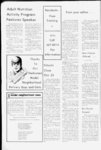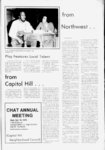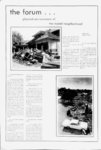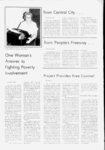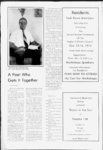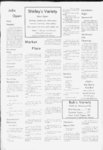| OCR Text |
Show ESJW salt lake October 12, 1972 Councils Funded By Model Cities The Model Cities Joint Board of Commissioners met 11 and Cities supplemental funds was not supported by residents, so citizens are getting the programs they want. Commissioner Stephen approved two contracts providing funding of $11,500 to two Harmsen urged neighborhood councils, relationship Redwood and People's Freeway. In attendance at the weekly meeting were several residents who protested the "tactics" used by Commissioner James Barker, who alledgedly submitted plans for project funding to the Crime and Delinquency Task Force after the September 15 deadline. Alberta Henry, Chairman of the Model Cities Education Task Force said she felt it was unfair to set guidelines and deadlines for residents and not commissioners. She stated that residents had worked long hours to plan needed programs and then when it came time to fund them, the money was spent by commissioners for other projects. Pete Grundfossen, (JjbJ free not for sale volume two Wednesday, October EMC Model Cities director, said the residents were in an advisory position only and that the Joint Board of Commissioners has the final word on how the money is spent. He said that last year only one of the 50 projects funded with Model closer working between Model a Cities staff, residents and the various departments administered by commissioners. He cited his own streets department as an example, saying, there are many projects planned in his department which would dovetail in with Model Cities projects. More interaction between commissioners and neighborhood councils was Model Neighborhood School Begins Intern Program by Kirk Terry The making of teachers who can effectively educate children in a classroom made up of students from different cultural backgrounds is the goal of Teacher Corps. The program enables the undergraduate education majors in college the chance to get actual classroom teaching time, better preparing that "intern" with the experience to immediately "teach" upon graduation from college. Teacher Corps, a national program administered in the state through Weber State College, advocated by Dorothy Pulley, People's Freeway Council. A special meeting of the funded by the Department of Health, Education and Welfare, is also compiling research that can Model Cities Coordinating be used in basic college Council will be held Thursday. October 12, 8:00 p.m., at the Northwest Center to determine funding of task curriculums to better assist the future teacher in educating children of different ethnic, racial and cultural backgrounds. Teacher Corps in Utah is piloted in schools in Brigham City, Ogden and in Salt Lake City at Edison Elementary School. The teacher oriented education program as it is being run at Edison, reviewed applications from undergraduates in Multi-purpos- e force projects. R out of coming this meeting will be the topic of discussion at a special Joint Board of Commissioners meeting on Friday, October 13 at 2:00 p.m in County Commission Chambers in the City and County Building. Children respond eagerly to Teacher Corp program. number eight education with minimum of 90 credit hours. Two teams of interns, five interns to a team, were selected and are supervised by a team leader who is a qualified teacher. At Edison, two teams have been assigned to the th i program has several aspects to it, but that the information from third Teachers must be able to respond to the different learning rates, a and sixth grades respectively. The interns are involved in a two year program of teaching, 60 percent of their time, 20 percent working directly with students and parents in the homes, and 20 percent engaged in community activities; as the teacher interns progress through the program they also maintain their college studies, eventually ending with a teacher certification. Charles Jensen, a junior in college majoring in Education, assigned to the Edison sixth grade classes, said that the program has enabled him to learn more about teaching than had his previous formal college education. Each team, he said, receives $250.00 for materials they desire in the classroom. Most of the money, he continued, goes for supplies that can be given directly to the students. The school, moreover, the children, are preparing a play to be given at a "parents night," on October 26, introducing the program to the parents. The props, he added, are program research and the subsequent development of viable teacher curriculums at the universities will be the strongest contribution of the program. interests and limitations of students. The main thrust of the Corps, she explained, is that of creating teachers that can teach to all students of different social backgrounds. She said one example of the program is that white children learn as readily about black vuure as do black children. At this age, she added, children aren't really influenced by cultural differences in that they enjoy learning about themselves and their classmates. This concept of responding to the education needs and differences of all students in the classroom, she said, will be the focal point of developing the teacher curriculum. That percentage of the intern's time spent in the homes, said Mrs. Horne, will provide the chance for the teacher and interns, to observe first hand the living environments of the students. This experience, she said, can assist the teacher in understanding the student, his being purchased with the interests, limitations, and materials money. Lois Horne, team leader for the sixth grade intern team, said that in June of this year, all the interns attended seminars at Weber State College, where they possibly some of the reasons for student's behavior in learning. must be enrolled for their education. Since school formally started at Edison just a month ago, she explained, the interns haven't yet been able to meet all the parents of the children in the grades the interns are assigned. The goal is to meet all parents, she continued, and with the few that have been contacted, the responses have been varied concerning the Teacher Corps. Some are favorable to the program, she stated, and some are sceptical. Mrs. Horne said that unfamiliarity with the new program probably accounts for most of the scepticism. Mrs. Horne explained that |


